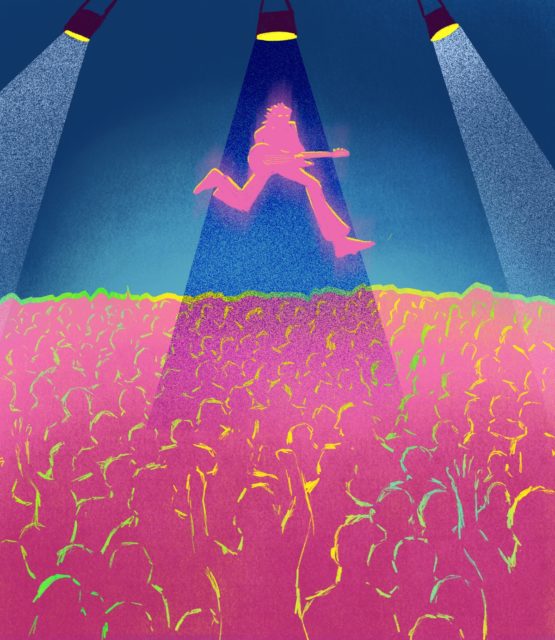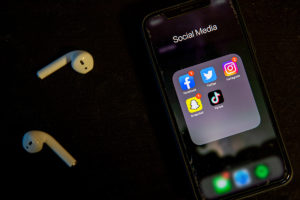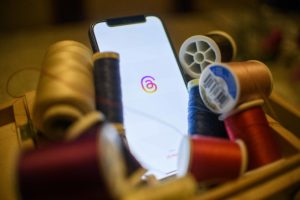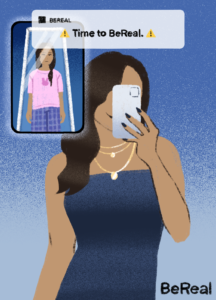On a bright June day, fans filed into Hyde Park in London for a Pink concert, eager for an unforgettable experience. Little did they expect the bizarre turn of events when, mid-song, a fan tossed a bag of her mother’s cremated remains onto the stage, leaving Pink visibly unsettled.
These absurd concert disruptions are nothing new as of late – from incidents like a phone being thrown so hard at Bebe Rexha that she needed to visit the hospital to Cardi B throwing a mic into the audience after being splashed by a drink.
Slowly but surely, mainstream concerts seem to be losing the etiquette that existed within them before, partially because of the COVID-19 pandemic and the stark rise of social media.
Although it is something we have heard many times before, it is painfully true that the social isolation of COVID-19 exacerbated our phone use and our need to be virtually connected to others at a level never experienced before.
Because of this extreme isolation, some audience members now enter concerts seeking to create viral moments separate from the shared group experience of watching an artist perform. This contributes to the poor behavior of audience members in hopes of being recognized by the artist and their fellow concertgoers.
Bobby Borg, a lecturer in the music industry department at the Herb Alpert School of Music, said concertgoers may be seeking a sense of recognition, especially after the pandemic.
“’I’m (concertgoers) coming to a show to be seen. I’m coming to the show to get recognized by others,’” Borg said. “’I’m coming to show off my latest outfit. I’m coming to be part of something that everyone else is part of so I can feel like I’m not missing out.’”
This need for attention, while always prevalent in concert culture, has been intensified by COVID-19. While many individuals were able to keep in contact with close friends during the pandemic, the ability to interact with acquaintances, peers and coworkers became limited.
Now that people have returned to social environments where they have the chance to prove themselves to others, it is clear that they will go to great lengths to achieve this peer reinforcement.
The rise of social media certainly increases this need. The ability to create and share short videos that can go viral instantly on platforms like Instagram and TikTok, encourages audience members to also participate in poor behavior to attract the attention of a larger online community.
For example, if a phone is thrown at an artist and the artist then stops and calls out the perpetrator, there is a high chance of that video going viral on the internet, Borg said.
This is correlated with the societal phenomenon of idolizing celebrities, influencers, artists and performers.
Tara Radmard, a first-year film student who works as a concert photographer for Cherry Pop Records, said concertgoers need to remember the boundaries to abide by at large shows.
“This is still just a human being, and you don’t know them. You need to keep your distance and not assume anything,” Radmard said.
When an audience member has been following a performer for years on social media, has attended multiple shows and listens to their music constantly, it is easy for them to form a dangerous parasocial relationship with the artist and have the illusion of a friendship.
This is also an aspect of the fan–performer relationship that has been reinforced by the rise of social media and the COVID-19 pandemic, when all of our connections – both parasocial and social – became digital.
“I feel like with social media getting more and more real – more like a front for things – you never know what to expect anymore. You see crazy stuff happening at concerts every day, … but obviously hope for the best,” said Hasitha Guhan, a third-year music industry student.
While concert culture and etiquette may be facing a hurdle right now, there is still hope.
Amid this wave of incidents at concerts, more and more fans are becoming aware of how unsustainable and dangerous these actions can be. Many have acknowledged their behavior at concerts and have truly committed themselves to trying to make the experience more inclusive, both through making online calls to action for fellow fans and creating group activities like making friendship bracelets to exchange during Taylor Swift’s Eras Tour.
So next time you’re at a concert, try to clap extra loud for your favorite songs, sing along if you know the words and maybe throw a compliment at a fellow fan rather than a drink – and definitely not your mother’s ashes.






Comments are closed.